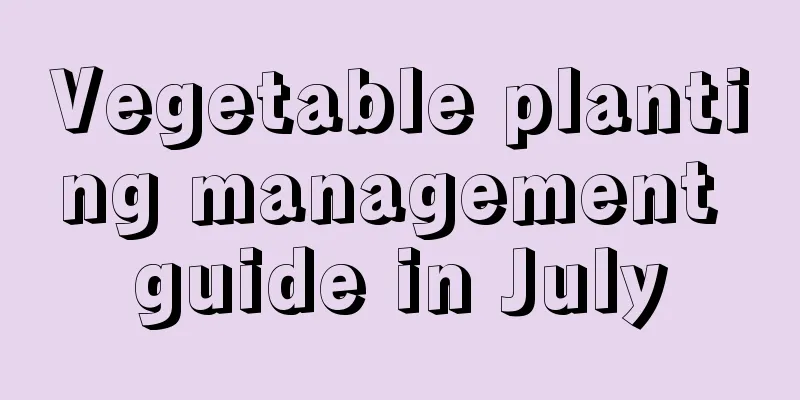Vegetable planting management guide in July

|
July is the hot and humid summer season, which brings both challenges and opportunities to vegetable growers. In order to ensure the healthy growth and yield of vegetables, some key management techniques should be mastered. The following guidelines are briefly shared with you. 1. Variety selection You can choose some high temperature resistant vegetable varieties, such as cowpea, amaranth, water spinach , etc. These vegetable plants can adapt to high temperature environments relatively well, and can still maintain normal growth and development if planted in July. 2. Seedling raising and sowing Cabbage, Chinese cabbage seedlings, lettuce, spinach, amaranth , celery, basella , radish and other vegetables are sown directly in the open field in batches and stages. Autumn cucumbers, autumn gourds, autumn tomatoes, autumn peppers, autumn watermelons, autumn melons, cowpeas, cabbage, cauliflower, and early-maturing Chinese cabbage can be grown in nutrient pots. 3. Field management In the high temperature season, transpiration is strong. After sowing, the soil should be kept moist to facilitate germination. When the land is dry, water should be applied in time in the morning and evening in combination with topdressing. In low-lying areas, waterlogging should be prevented to maintain sufficient supply of fertilizer and water to the soil. For vegetables such as melons grown on trellises and eggplants, attention should be paid to timely removal of old, diseased and residual leaves from the lower part of the plant. For vegetables planted in rows, attention should be paid to inter-row cultivation and weeding. 4. Improve ventilation During the high temperatures in July, it is very important to properly manage ventilation for vegetables. Firstly, the temperature in the greenhouse can be lowered to prevent sunburn by using sunshade nets, cooling agents or mud. Secondly, the roof and lower vents can be fully opened to promote circulation, and a 40-mesh insect-proof net can be installed to prevent insect invasion. 5. Pest and disease control The hot and rainy weather conditions in July are likely to cause outbreaks of pests and diseases, so farmers need to strengthen their monitoring and prevention of pests and diseases. Once pests and diseases are discovered, timely measures should be taken to control them to prevent the disease from spreading. 6. Disaster relief Typhoons are frequent in July, so eggplant and solanaceous vegetables need to be harvested in advance and mature fruits need to be picked and removed to reduce density and prevent lodging. After the disaster, tidy up the trellises, clean up the damaged plants, and ensure the normal growth of healthy plants. At the same time, spray boron fertilizer on the leaves to enhance the plant's ability to pollinate and fertilize and prevent flowers and fruits from falling. The above is an introduction to the vegetable planting management guide for July. Through the above comprehensive management measures, the impact of high temperature and high humidity weather on vegetable production can be effectively reduced, ensuring the normal growth and yield of vegetables.
|
<<: Fruits suitable for spring
Recommend
When is the best time to plant cucumbers for high yield (cucumber planting technology and planting time)
Cucumber is a melon vegetable, native to tropical...
How big is the world's largest watermelon and where is it produced?
1. How big is the world's largest watermelon?...
Can bamboo be planted in a cemetery?
Can bamboo be planted in a cemetery? Bamboo can b...
A complete guide to common sunflower pests
Meadow borer When there are fewer pests, you can ...
Taboos of breeding winter red in winter
Although winter is the flowering season, do not w...
What to do if Monstera leaves don’t crack
Reasons for not cracking Friends who grow Monster...
How to prune rose begonias and when to prune them
1. Pruning time You can prune rose begonias at an...
The efficacy and contraindications of drinking Astragalus and wolfberry in water
1. Efficacy Astragalus and wolfberry are both goo...
How many kilograms of black carrots can be produced per mu?
Black carrot yield per mu Black carrot is a type ...
How to plant shallot seeds
Onion seed planting time Scallion seeds are more ...
How to cultivate ginseng fruit to make it bear fruit
Ginseng fruit growing conditions The temperature ...
Does Lily Bamboo prefer shade or sun?
Does Lily Bamboo prefer shade or sun? Lily bamboo...
When is the best time to harvest soybeans?
Soybean harvest time Soybeans are planted at diff...
How to grow potted jasmine? How to grow potted jasmine?
Jasmine potted cultivation method 1. Soil: When c...
The flower language and meaning of black chrysanthemum, what are the taboos of giving it as a gift?
1. Flower language and meaning 1. Fairness and ju...









